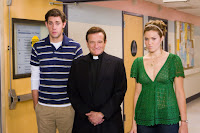 According to Schickel and Corliss, Mani Ratnam's Nayakan is supposedly one of Time's ALL-TIME 100 Movies. And Crash is supposedly the best picture of 2006, so you never know. Just as Criterion is wrong about House of Games, so are the Time reviewers when it comes to Nayakan. This is a terrible, terrible excuse for a movie. The plot concerns Velu, who witnesses his father's murder as a young boy and grows up to become a mobster boss in the vein of Godfather meets Robin Hood. While it steals heavily from The Godfather (which I'll get into later), there are some interesting nuggets unique in this film that weren't stolen from better ones. These are few and far between, and instead what makes up the majority of the film is crap.
According to Schickel and Corliss, Mani Ratnam's Nayakan is supposedly one of Time's ALL-TIME 100 Movies. And Crash is supposedly the best picture of 2006, so you never know. Just as Criterion is wrong about House of Games, so are the Time reviewers when it comes to Nayakan. This is a terrible, terrible excuse for a movie. The plot concerns Velu, who witnesses his father's murder as a young boy and grows up to become a mobster boss in the vein of Godfather meets Robin Hood. While it steals heavily from The Godfather (which I'll get into later), there are some interesting nuggets unique in this film that weren't stolen from better ones. These are few and far between, and instead what makes up the majority of the film is crap.There were too many music/dancing interludes. I'll be the first to admit that I just don't get them; they are nothing but absolute wastes of time for me. They have nothing to do with the movie and make it 30 minutes longer. The music itself, which was good at first, quickly became overused and trite. While the acting could very rarely be good at times, more often than not it sounded fake and stilted. I feel uncomfortable judging the cinematography and sound, as I feel half of the fault is the DVD I have. However, I saw the only DVD version of it available in America, so I saw the same version you would be seeing. And with that in mind, the cinematography and sound SUCK. The concepts and ideas behind the camerawork were often valid, but in execution they just didn't work. Ever. It looked like it was shot on a handheld, miniDV camera, and perhaps it was a bootleg copy. I wouldn't be surprised.
The extent of the plagiarism of The Godfather makes me sick. Velu's family is attacked in his home, just like in the second Godfather. A series of murders are committed during a religious ceremony, just as there is in the first Godfather. There is even a murder where a man is garrotted in his car, and in his struggling, he breaks the windshield with his feet. Velu is asked by a man to punish young men who beat up and disfigured his daughter. This movie misses all the things that make the Godfather good, and instead imagines its qualities are in simple plot devices instead of subtlety and nuance. It's almost an insult to The Godfather to watch this film. If you have any respect for quality filmmaking, don't watch this movie.
IMDb link: http://imdb.com/title/tt0093603/




















